The MTHFR gene is key to a process called methylation, which pretty much runs the entire show in our human body, regulating innumerable critical functions. The importance of a well-functioning methylation cycle, thus, cannot be overstated. But when there are unfavorable changes in the MTHFR gene, methylation could be affected, increasing your risk for numerous health conditions. A genetic methylation test is a simple way to identify whether or not you carry the MTHFR gene changes. Well, what if you do? The fix is as simple as it gets. Read on to learn more about MTHFR and methylation, how to get a genetic methylation test, and ways to combat MTHFR mutations.
What Is Methylation?
Methylation is a critical biochemical process within the human body, governing myriad functions from DNA production to brain chemical synthesis.
This intricate process is vital in regulating key bodily systems, including cardiovascular, neurological, reproductive, and detoxification pathways.
At its core, methylation is about turning biological gears and switches on and off, enabling the body to function optimally.
The MTHFR Gene And Methylation
Central to this process is the MTHFR gene, which encodes for the enzyme methylenetetrahydrofolate reductase.
This enzyme is instrumental in processing amino acids, the fundamental building blocks of proteins. MTHFR's significance is particularly pronounced in a chemical reaction involving different forms of vitamin B9 (folate).
This reaction is a crucial step in the methylation process.
The MTHFR enzyme also aids in converting homocysteine into methionine, an essential compound needed by the body for protein synthesis and the formation of other critical substances.
The MTHFR Gene Variants And Methylation
In the study of genetics, a variant refers to any deviation in the DNA sequence from what is typically expected.
Focusing on the MTHFR gene, each individual carries two copies of this gene, inheriting one from each parent.
Approximately 40% of the adults carry at least one mutation or variant in the MTHFR gene, which leads to less than optimal enzyme activity.
The two common variants in the MTHFR gene are:
- The C677T variant
- The A1298C variant
The presence of these variants can lead to elevated levels of homocysteine in the blood.
Homocysteine is an amino acid that, at high levels, may be associated with a range of health issues, including:
- Heart attack
- Birth anomalies
- Glaucoma
- Certain mental health conditions
- Stroke
- Some types of cancer
Understanding the possible genotypes for these MTHFR variants is crucial in determining an individual’s genetic predisposition to these health issues.
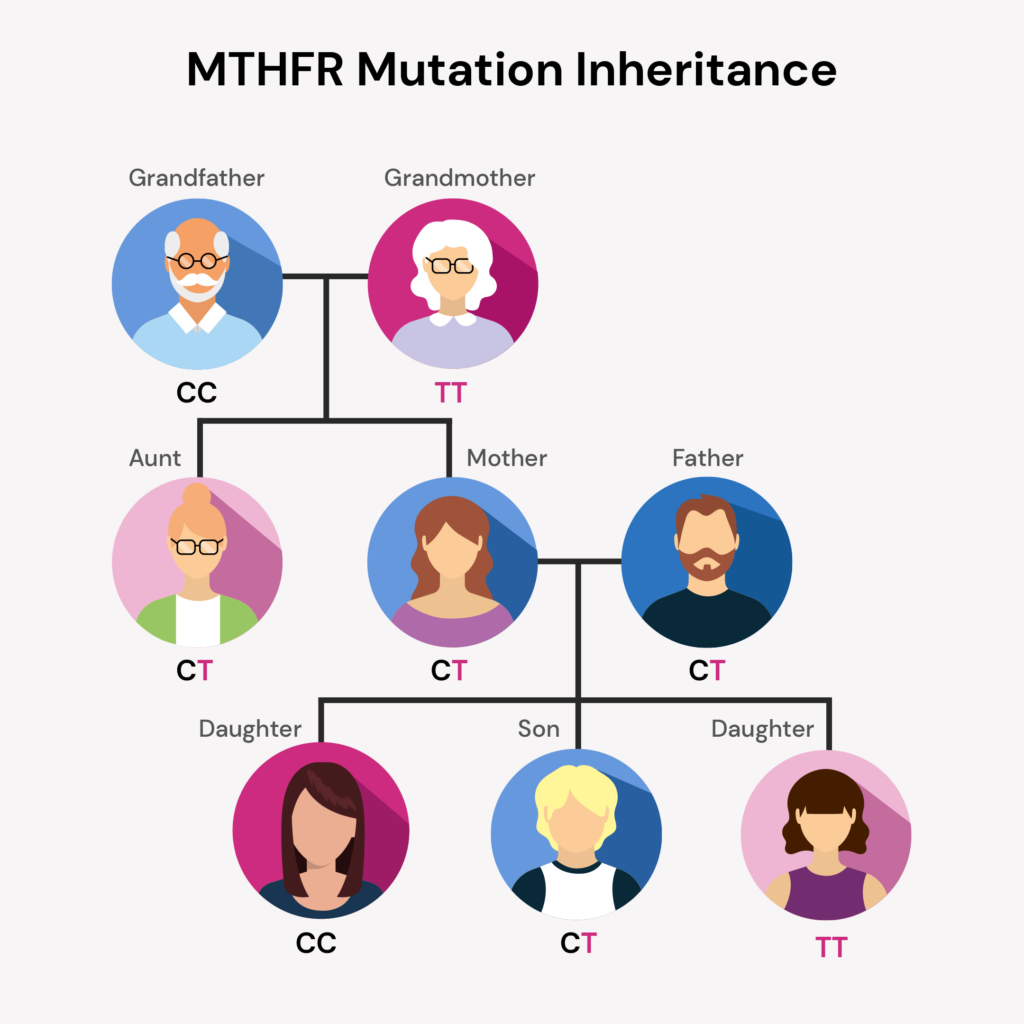
What Is A Genetic Methylation Test?
The methylation pathway in our bodies is influenced by many genes. The most important one is the MTHFR gene. Others include:
- MTRR
- MTR
- AHCY
- COMT
A methylation genetic test analyzes these genes associated with the methylation pathway to look for any changes or variants that may result in less-than-optimal functioning.
The results can help you understand your methylation status and underline nutritional needs to support your methylation.
What Is The Price Of A Genetic Methylation Test?
A genetic methylation test typically costs between $200 and $500, depending on the specific panel and lab used.
However, some DNA analysis companies let users upload their existing raw DNA files to avail the methylation report for a lower cost.
More comprehensive tests that include blood biomarkers, etc, can cost up to $1,000.
The following are some popular choices for a genetic methylation test.
| Company | Test | Price |
| Xcode Life | 15 gene panel, 60 variant methylation report | |
| StrideDNA | 19 gene panel | |
| LifeDNA | 12 gene panel | $249 |
| 10X Health System Gary Brecka | ~5 methylation genes | $599 |
Genetic Methylation Test Near Me
Clinical methylation tests will mostly require a visit to the lab, where a clinician will provide guidance.
You can find your nearest lab here.
Many direct-to-consumer genetic testing companies also offer genetic methylation tests.
Some ship out DNA kits, which you can collect your sample and ship back. Some areas may be unserviceable.
Services like Xcode Life allow you to upload your existing ancestry test raw DNA file to provide a comprehensive methylation report.
The best part? You can do it from anywhere in the world.
Xcode Life Methylation Genetic Test – What Is It?
The Xcode Life Methylation Genetic Test utilizes raw data obtained from popular ancestry genetic testing service providers like 23andMe, Ancestry DNA, Family Tree DNA (FTDNA), Living DNA, and My Heritage to provide the MTHFR and Methylation report.
The test analyzes more than 15 genes associated with the methylation pathway.
The test specifically detects two common mutations in the MTHFR gene:
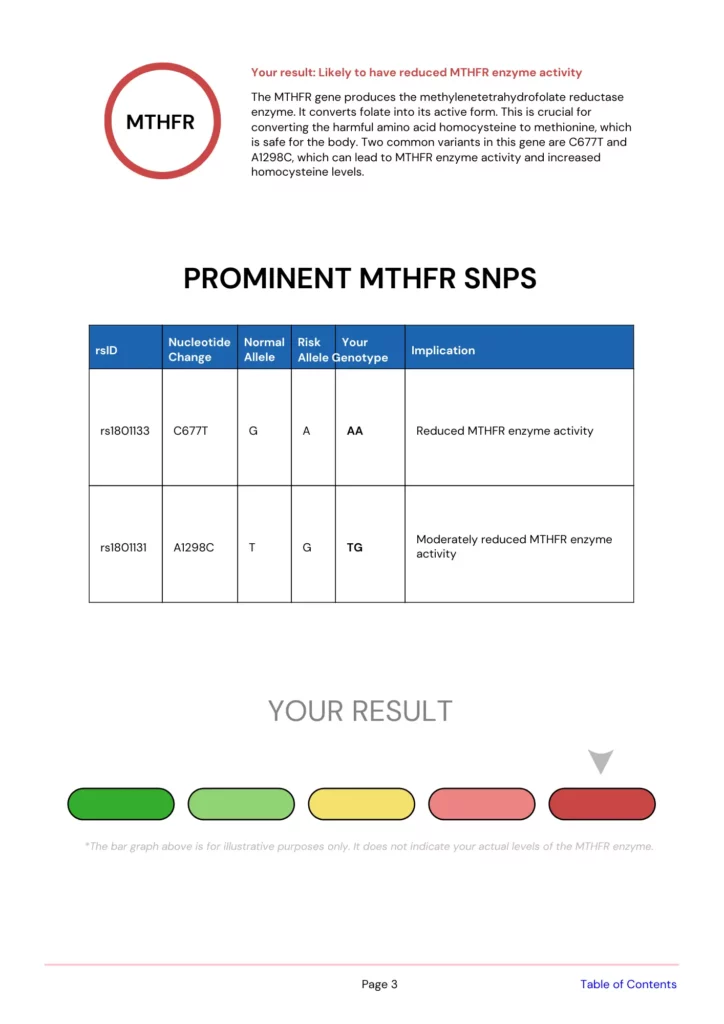
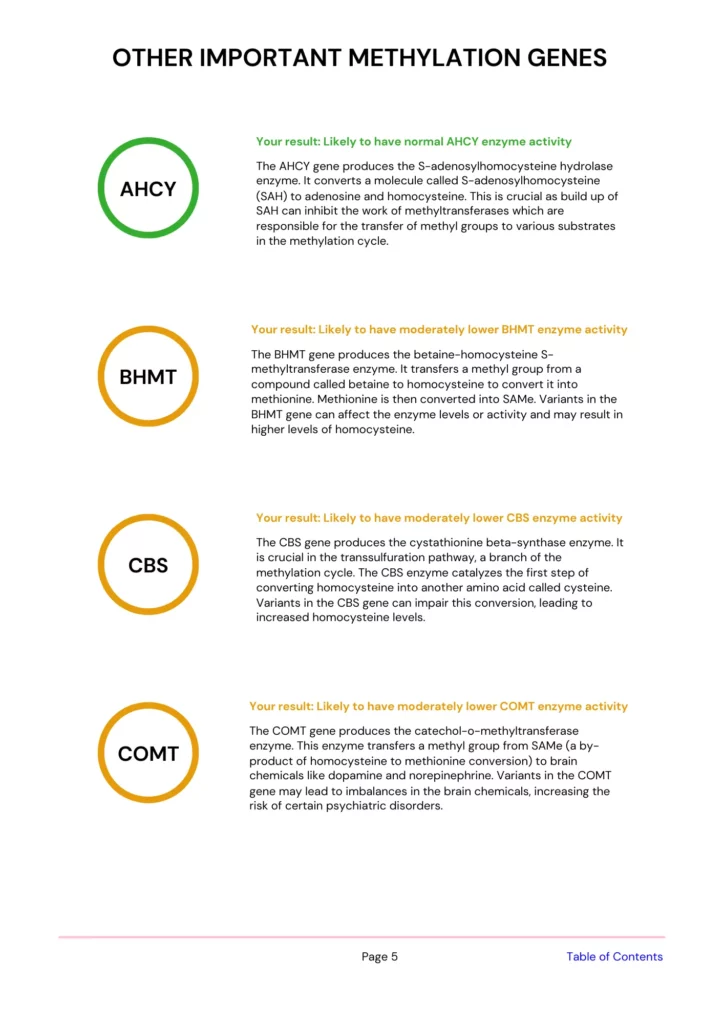
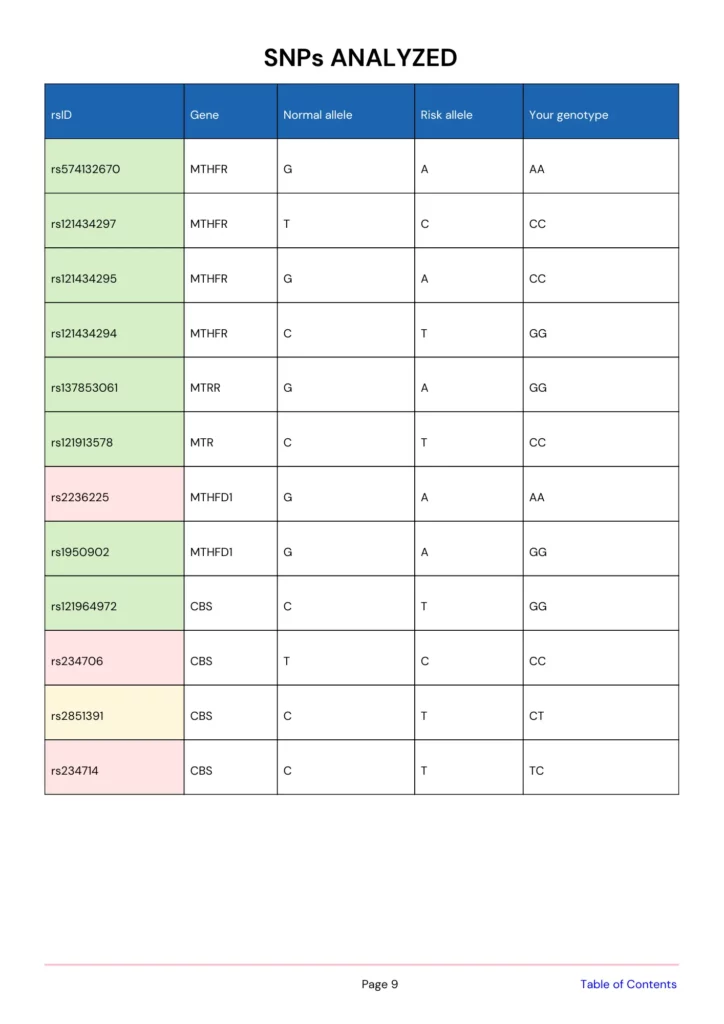
The MTHFR Report will indicate whether these mutations were detected in the individual’s genetic data.
In addition to the detection of mutations, the report also provides an interpretation of the results.
The report has a section titled “Other Methylation Genes,” which profiles your genotypes for variations in the other methylation genes, which are associated, in varying degrees, with methylation.
| Other Methylation Genes | ||||
| MTR | COMT | AHCY | SHMT | CTH |
| MTRR | NOS3 | MTHFD1 | CBS | MAT1A |
| BHMT | MAO-A | GNMT | CPS1 | MTHFR |
For a sample MTHFR report/ preview of the report, click here.
Did You Know?
The DNA data from your genetic ancestry test can be used to identify if you have MTHFR gene mutations. You can discuss these results with your doctor, who can recommend the correct course of action for you. Download your DNA data and upload it to Xcode Life to learn about MTHFR and 1,500+ things about your health.
Katy Says
I’m so glad I confirmed once and for all about my MTHFR status. The genetic testing my practitioner offered was extortionate. After completing my AncestryDNA, I was able to upload my raw data file with Xcode Life at a very reasonable price and receive a report that was very easy to understand. I now have a concrete plan on how to go about lowering my homocysteine and checking its status every year... Read More.
How To Interpret The Methylation Genetic Test?
In Xcode Life’s MTHFR report, the initial section will specify which, if any, of the 2 prominent variants of the MTHFR gene you have.
Depending on the results, the MTHFR enzyme activity will be provided as a bar diagram.
If the pointer is in orange or red, please discuss the results with your doctor so that they can correlate them with family history and clinical symptoms to recommend suitable supplementation if you require any.
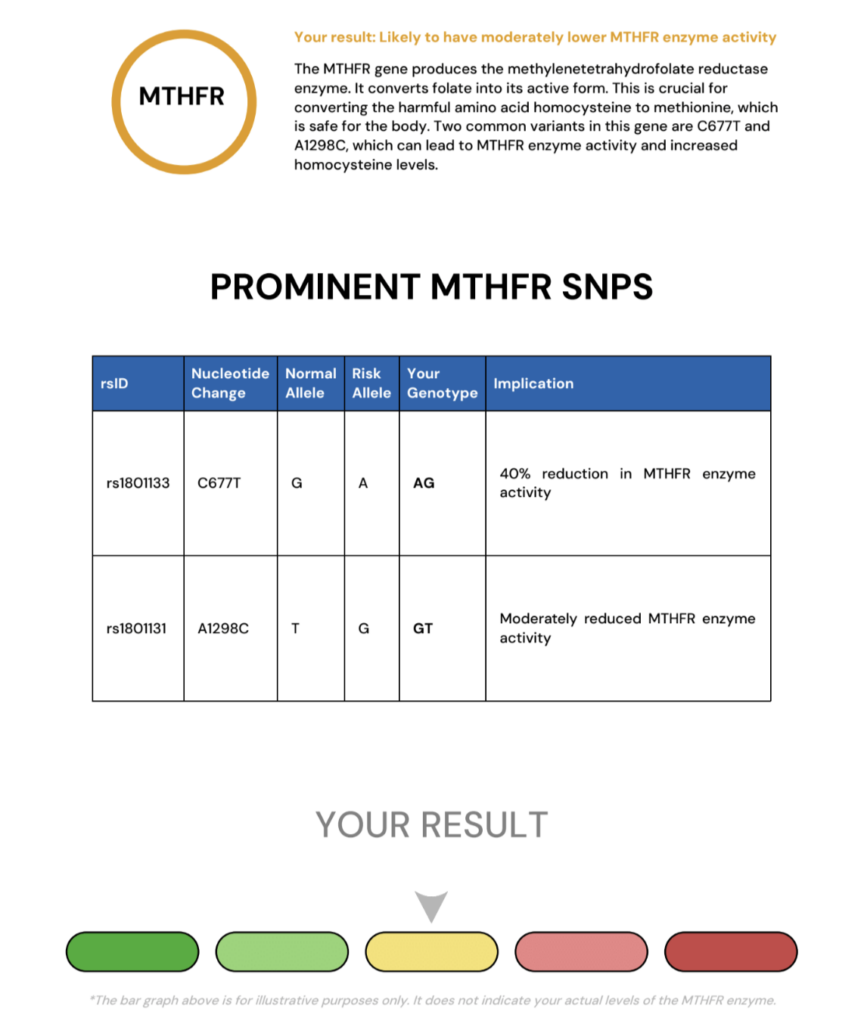
The next section of the report includes information on variants in other genes that partially influence MTHFR enzyme activity.
The presence of a large number of homozygous (2 risk variants- red color) of high-ranking SNPs may be associated with lower enzymatic activity.
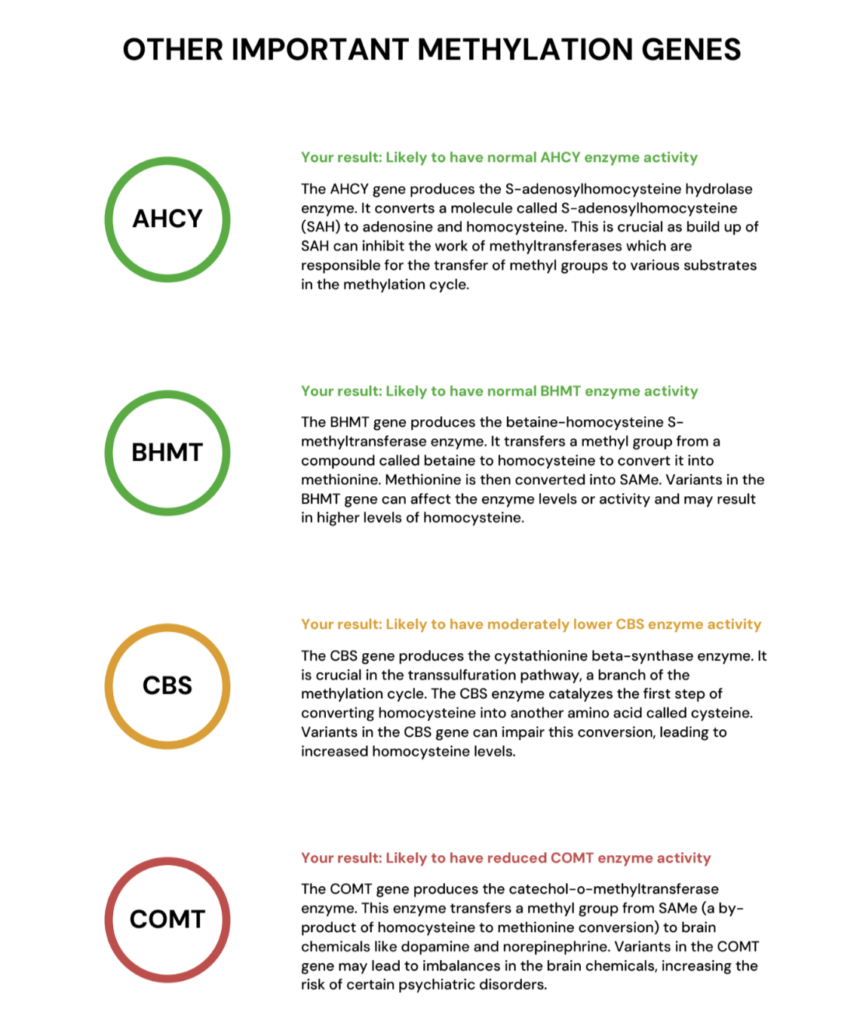
5 Ways To Improve Methylation Naturally
Improving methylation, a crucial biological process, can significantly impact overall health. Here are five natural ways to enhance methylation:
- Adopt a nutrient-dense diet: Focus on whole, unprocessed foods rich in natural folate, B vitamins (including B6 and B12), magnesium, zinc, and protein.
These nutrients are essential methyl donors and key components of normal methylation.
Foods particularly beneficial for methylation include dark leafy greens, asparagus, avocado, garlic, onions, cruciferous vegetables (like kale and broccoli), fish, eggs, beans, nuts, seeds, grass-fed meats, and probiotic foods.
High-antioxidant foods, such as berries, citrus fruits, and dark chocolate, are also valuable.
It's equally important to limit inflammatory foods like gluten, added sugar, processed meats, and refined vegetable oils. - Supplement appropriately: Alongside a healthy diet, supplements can fill nutritional gaps.
Your doctor can prescribe high-quality multivitamins or specific supplements providing adequate daily values of L-methylfolate, vitamin B12 (as methylcobalamin), vitamin B6, vitamin B2, zinc, vitamin D3, magnesium, betaine, and protein powders like collagen or whey. - Exercise regularly and prioritize sleep: Managing stress through regular exercise and sufficient sleep is vital for optimal methylation.
Aim for at least 30 minutes of daily exercise and 7-9 hours of sleep each night to combat free radicals and promote detoxification. - Limit exposure to harmful substances: Avoid smoking, excessive alcohol consumption, and certain medications that can impair liver function and disrupt methylation.
This includes being mindful of various drugs, such as some antibiotics, birth control pills, antidepressants, and cholesterol-lowering drugs, which may deplete folate levels or interfere with methylation. - Reduce toxin exposure and support detoxification: Since methylation is closely linked to detoxification, minimizing exposure to toxins is crucial.
This includes avoiding cigarettes, alcohol, and harsh chemicals in cleaning agents and beauty products.
Bonus Tips
Additional strategies include increasing the intake of coenzyme Q10, phosphatidylcholine, folic or l-methylfolate, and vitamins B6 and B12, which are integral to the methylation process.
Maintaining gut health, improving stomach acid, and supplementing with antioxidants, magnesium, and zinc can also support proper homocysteine metabolism.
Remember, while these natural approaches can improve methylation, it's crucial to consult with a healthcare provider for personalized advice, especially regarding supplementation and diet modifications.
Summary: Methylation Genetic Test
Methylation is a vital biochemical process in our bodies, influenced significantly by the MTHFR gene and its two important variants, C677T and A1298C.
These common genetic mutations, found in a significant portion of the population, can lead to elevated homocysteine levels and associated health risks.
The Xcode Life Methylation Genetic Test offers an in-depth analysis of these variants using data from popular ancestry testing services. It provides a comprehensive MTHFR report, helping individuals understand their genetic predisposition to methylation-related issues.
To support optimal methylation, adopting a nutrient-dense diet, supplementing appropriately, regular exercise, adequate sleep, limiting exposure to harmful substances, and reducing toxin exposure are key strategies.
Additionally, incorporating specific nutrients and supplements like coenzyme Q10, phosphatidylcholine, folinic acid, and vitamins B6 and B12 can further enhance methylation processes.
It's important to consult with healthcare professionals for personalized guidance and to ensure these natural methods align with your individual health needs.
References
https://www.nature.com/articles/npp2012112
https://www.medicalnewstoday.com/articles/326181
https://www.cdc.gov/ncbddd/folicacid/mthfr-gene-and-folic-acid.html




